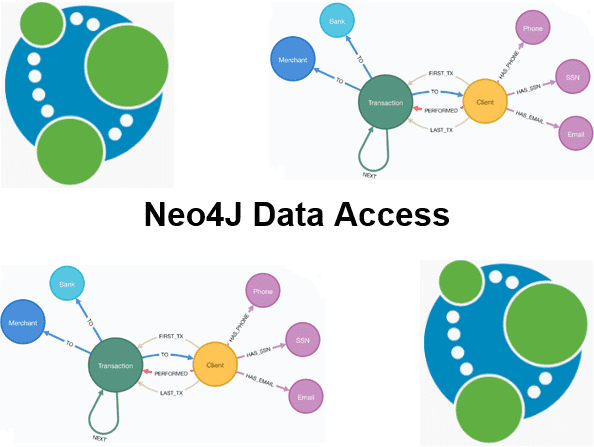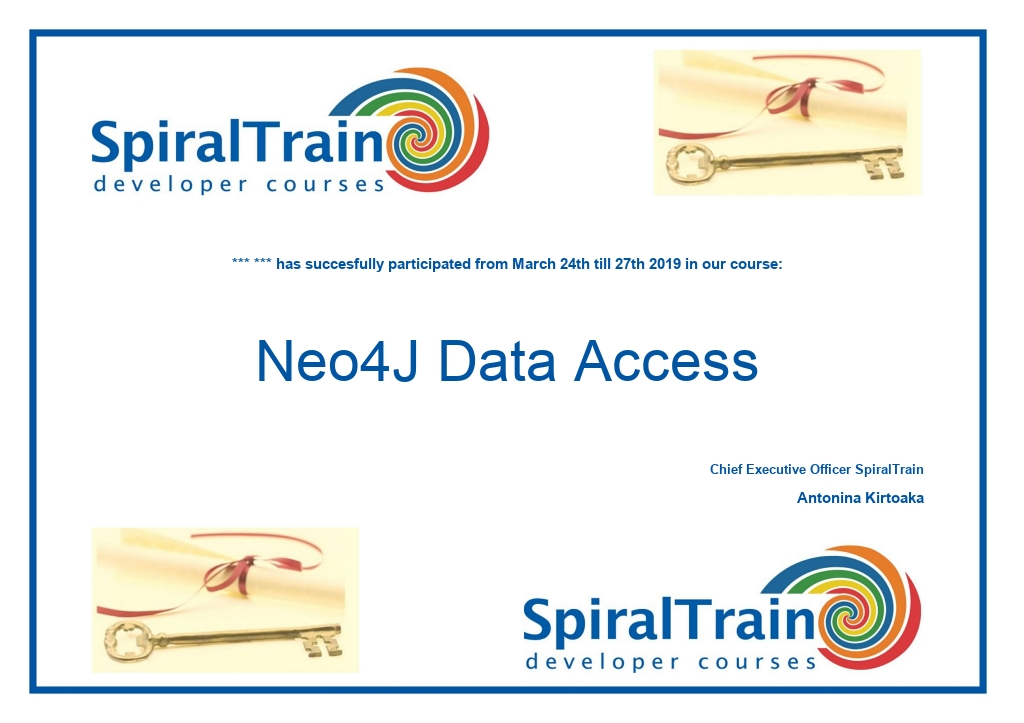-
Learning by doing
-
Trainers with practical experience
-
Classroom training
-
Detailed course material
-
Clear content description
-
Tailormade content possible
-
Training that proceeds
-
Small groups
In the course Neo4J Data Access from SpiralTrain the participants learn to store and access data in the Graph database management system Neo4J. Neo4J is the most widely used Graph database and is developed in Java. Neo4J is a NoSQL database, is scalable when processing large amounts of data and supports transactions.
The course starts with an explanation of the basic concepts of Graph databases in which data is modelled in the form of a graph. The nodes of a graph represent the entities and the relationships between the entities are represented by the associations between the nodes.
Next the Property Graph Model in Neo4J and the possible relationship types are discussed. Nodes and relations store data in key-value pairs called properties. Node Labels, Graph Global Operations and In Graph Indexes are also discussed.
Extensive attention is also paid to the Cypher Query Language that is used in Neo4J for data access. Path finding queries, the use of parameters and complex queries are discussed and the Neo4J Data types as well.
The various Cypher Query clauses such as CREATE, MERGE and SET are treated and the functions available in the Cypher Query language are also part of the course program.
The course concludes with a discussion of the use of Neo4J in Java and Spring applications, importing data from CSV files, batch inserts and the Neo4J Shell Tools.
The course Neo4J Data Access is intended for software developers who want to use the Graph Database Neo4J to access, query and modify data.
Experience with software development in a language like Java, C#, JavaScript or Python is required and knowledge of JSON is recommended.
The course has a hands-on character. The theory is treated on the basis of presentation slides and is interchanged with practical exercises. Course times are from 9.30 up and to 16.30.
After successful completion of the course the participants receive an official certificate Neo4J Data Access.

Module 1 : Neo4J Intro |
Module 2 : Graph Databases |
Module 3 : Cypher Queries |
|
What is Neo4J? Key Concepts Neo4J Characteristics NoSQL Databases Key Value Stores Document Stores Graphs Databases Cypher Queries Path Queries Indexes and Caching Installing Neo4J Extending Neo4J |
Property Graph Model Node Labels Relationship Types Graph Global Operations Graph Modeling Design for Query Ability In Graph Indexes Granulate Nodes Graph Pitfalls Rich Properties Unconnected Graphs Dense Node Pattern |
Path Finding Queries MATCH Clause RETURN Clause Properties Neo4J Data Types Numerics and Strings Booleans and Arrays Neo4J Browser Usage Using REST API Query Parameters Complex Queries Shortest Path |
Module 4 : Cypher Clauses |
Module 5 : Cypher Functions |
Module 6 : Neo4J Applications |
|
CREATE Clause CREATE UNIQUE DELETE and REMOVE WHERE Clause ORDER BY INDEXES CONSTRAINTS LIMIT and SKIP WITH and UNWIND UNION and USING MERGE and SET |
Key Functions Mathematical Functions Node Functions Relationship Functions count length type id timestamp labels collect |
Embedded versus REST Using Java API BatchInserter Batch Indexing Import Data from CSV Import Using Cypher CSV Lint and Papa Parse Neo4J Shell Tools Importing Relationships Exporting Data Spring Data and Neo4J |
